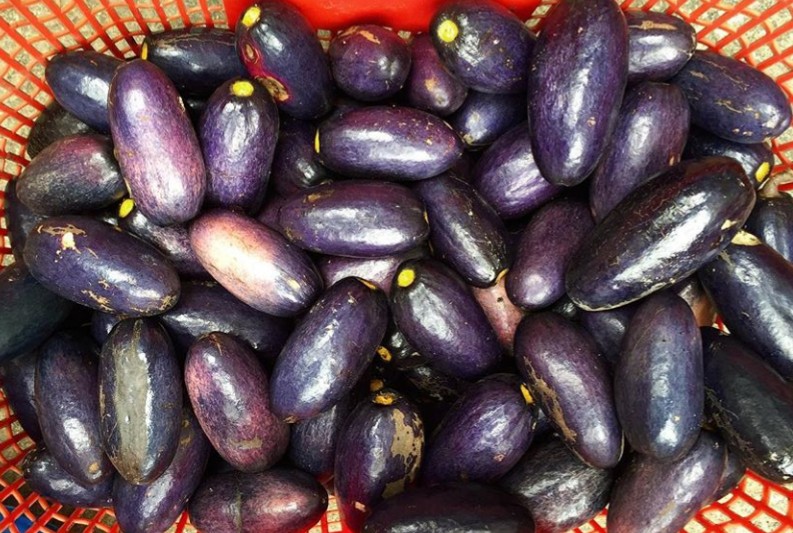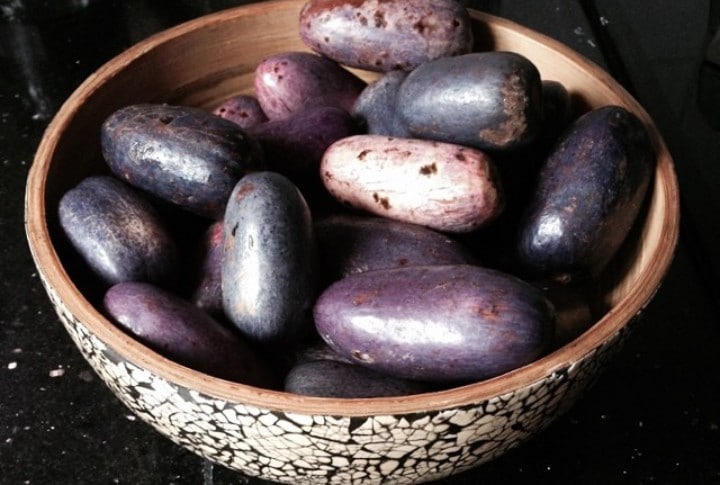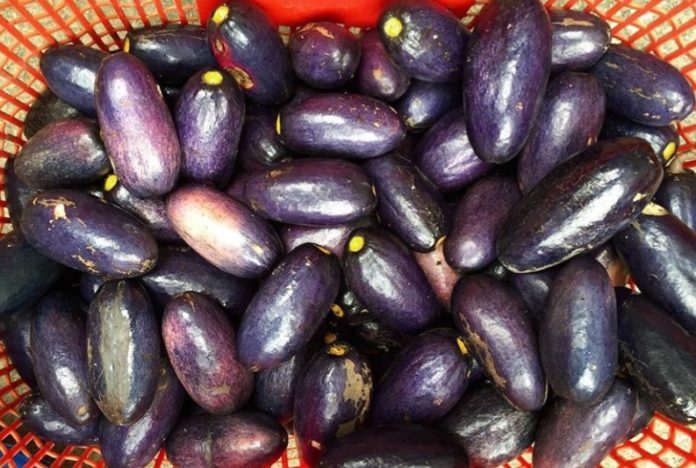Nigerian pear or African pear is a delicious fruit that originates from the Western Part of Africa, and it is often eaten with roasted or cooked corn. In the southeastern part of Nigeria, it is called Ube. However, Nigerian pear is scientifically known as Dacryodes Edulis.
However, apart from being a super delicious fruit, Nigerian pear is also beneficial to human health, and in fact, it should be eaten on a regular basis by all and sundry. Today you will find out the nutritional content of Nigerian pear, as well as its health benefits.
Nutritional Content of Nigerian Pear

A study by Dr. Onuegbu NC et al., from the Department of Food Science and Technology Federal University of Technology, Owerri, Nigeria isolated the nutritional properties of Nigerian pear.
Nigerian pear is rich in carbohydrates, proteins, lipids, fixed oil, and crude fibre. It also contains moderate amounts of potassium, calcium, sodium, magnesium, and phosphorus. Nigerian Pears also contain a lot of fatty acids like palmitic acids, oleic acids, and linoleic acids.
Nigerian pear calories are 40.3 calories per 100g. The amino acid profile also showed that it is very rich in essential amino acids such as Lysine, Phenylalanine, Leucine, and Isoleucine.
Additionally, a wide variety of chemical compounds such as terpenes, flavonoids, oxalates, tannins, alkaloids, and saponins have been isolated from Nigerian pear (1).
7 Potent Health Benefits of Nigerian Pear (Ube)

Here are some of the major health benefits of Nigerian pear or Ube.
1. Promotes Skin Health and Combats Skin Diseases
Our article on the benefits of Nigerian pear would be completely shallow if we fail to mention that it is an excellent source of fibre, folate, pantothenate, and vitamins like vitamin B6, thiamine, niacin, riboflavin, the antioxidant vitamin (vitamin C), all of which works together to give you a glowing, younger-looking skin while combating free radicals in your body.
To be specific, the fiber in Nigerian pear helps in getting rid of yeast and fungus from the body to prevent them from causing acne and rashes on your skin, while the folic acid helps in eliminating toxins from the body to reduce the appearance of acne and to increase the skin’s firmness. Additionally, the content of pantothenate in Nigerian pear is beneficial to the skin such that it helps in combating acne as well as speeding up the healing process when there is a wound on the skin.
That said, Nigerian pear is also used in treating various ailments, including mouthwash, sickle cell disease, malaria, arthritis, wounds, skin diseases, ringworm, craw-craw, dysentery, fever, and lots more.
Depending on the kind of ailment you are facing, there are numerous ways you can use this fruit for treatment; for instance, you have to combine its powdered form with malagueta pepper to treat anemia or oral bleeding, while you have to mix it with palm oil when treating pains, stiffness or skin-related diseases. [You can perform a Google search to know how Nigerian pear is used in treating several other ailments].
2. Promotes Healthy Pregnancy
Nigerian pear contains folate [a B vitamin] called “Folic acid,” which is essential for everyone, especially pregnant women. Part of the reasons why this vitamin is essential for pregnant women is that it helps in creating new cells and producing DNA. Not that alone, the Folic acid in Nigerian pears also helps in preventing serious birth defects, including Spina bifida [a neural tube defect when a baby’s spinal cord and brain is unable to develop outright], Encephalocele [a condition which causes a child’s brain to extend through the skull], Anencephaly [a birth defect when a child’s brain and bone is unable to form or develop outright]. These and more are what make Nigerian pears an excellent food for pregnant women, so be sure you consume the fruit regularly.
3. Lowers High Blood Pressure
Bush pears contain essential minerals such as potassium, which plays a major role in promoting the optimal functioning of the human body. When you consume Bush pears regularly, the potassium content in it will help balance out the negative effects of salt in your body, and thus lowering high blood pressure as well as reducing the risk of stroke. To lower high blood pressure with pears simply eat 4 – 7 portion of this super delicious fruit daily, and you will notice an improvement in your overall wellbeing.
4. Promotes Healthy Oral Health
Nigerian pear contains a great amount of antimicrobial properties, and for this reason, it is being used in making toothpaste in certain parts of Africa. In addition to that, multiple local studies reveal that these potent properties also play a major role in combating the bacteria, which often causes mouth odor and tooth decay.
Therefore, if you are looking for a natural way to handle either of the two mouth conditions, it is recommended you increase your pear fruit intake to quicken the recovery.
5. Cleanses the Body System
Due to one reason or the other, your body may be harboring various unnecessary organisms which may further result in certain health conditions. However, there’s an effective way you can get rid of those redundant organisms, which is – regular consumption of Nigerian pear. This fruit contains some potent antioxidants which help in cleaning unneeded organisms from your body and thus improving your overall wellbeing. In addition to that, Nigerian pear is also proven to be excellent in reducing the occurrence of certain diseases while inhibiting the oxidation of other molecules in the body.
6. Helps in Treating Eye problems
The importance of Vitamin C to the human eye can never be overemphasized as it helps in keeping the eye healthy by enhancing the formation of eye-related connective tissues, protecting the eyes against damaging free radicals, reducing the risk of cataract and vision loss.
More importantly, Nigerian pear is an excellent source of the aforementioned antioxidant [Vitamin C], which means it will help improve your eyesight while also preventing against eye-related diseases like cataracts and the host of others.
7. Antioxidants and Antimicrobial properties
Nigerian Pear or Ube also contain a lot of powerful antioxidants that helps in warding if harmful free radicals from the body. (2) They also have effective antimicrobial properties that prevents the body from contracting diseases.
Nigerian Pear and Weight Loss
Nigerian pear is not fattening, they contain healthy lipids and good cholesterol. The calories in Nigerian pear is also moderate. Although, the fat content in this fruit is a lot higher when compared to fruits like apple, guava, and pawpaw, pear cannot make you fat if you eat it moderately.
How to enjoy Nigerian Pear

Nigerian pear is not a demanding recipe and is extremely easy to prepare. Just placing it inside hot water for few minutes or boil for a couple of minutes and it will soften. The fleshy, softened pulp is melted and can be eaten raw. Nigerian pear can also be roasted, but its seed is not edible. Many Nigerians prefer to eat a roasted pear with roasted corn.
Another interesting way to enjoy pear is to substitute the fleshy pulp for butter or margarine to eat bread. You can also eat Nigerian pear with rice, salad, yam, boiled plantain, and roasted yam.
Thanks for reading, please comment and share!
References:
(1). Ajibesin K.K. 2011. Dacryodes edulis (G. Don) H.J. Lam: A review on its medicinal, phytochemical and economical properties.Research Journal of Medicinal Plant 5(1):32-41
(2) A Conrad and Agbara I Uche (2013) Assessment of In vivo antioxidant properties of Dacryodes edulis and Ficus exasperata as anti-malaria plants.Asian Pac J Trop Dis. 2013 Aug; 3(4): 294–300




This is so interesting! An artisan ice cream place i go to has Ube ice cream and ube flavored and colored cones. I never knew what they were made of, only that the color was super vibrant and tasted delicious. Now I know!
Thanks for the enlightenment
……..does it help in reducing or regulating blood sugar in diabetes?